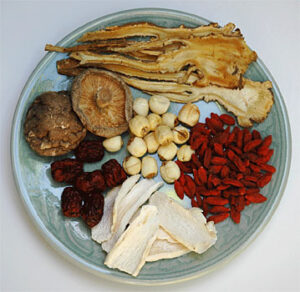- 5457 Twin Knolls Rd. Suite #300
Columbia, MD 21045 - Call Us
443. 979.7550 - Open Hours
Monday - Friday: 7:00AM - 6:00PM (by appointment)

During pregnancy, the focus is often on supporting the health of the mother as this directly affects the growth and development of her baby. Nourishing the mother is often forgotten after the birth of her child. In Traditional Chinese Medicine, maintaining a woman’s health is also highly emphasized in the postpartum period. During this time, women in China follow strict guidelines regarding diet and lifestyle in order to support the return of health and vitality.
The postpartum period is considered to be the 4 months following the delivery, the first month being the most important time to take special care of oneself. After delivery, a new mother’s qi (vital energy) and blood are deficient, and not until the end of the 4th month does her yin and blood become fully replenished. In Chinese medicine, this is viewed as a critical period in a woman’s life when caring for and nourishing herself can have a great effect on her health and vitality far into the future.
Below are some basic recommendations for the postpartum period:As difficult as it may be in these modern times, new mothers should take special care to get enough rest and nourishment. In order to help restore the circulation of qi and blood, when feeling stronger they should try to find time for regular but moderate activity such as walking. In China, during the first month after delivery, strict limitations are set so that few visitors are allowed to disturb the new mother and her immediate family, except to drop off meals.
Digestion tends to be somewhat weak after delivery and because there is a great demand for nutritious food in order to produce good breast milk, warm, nourishing and easy to digest foods are recommended. Traditionally, soups are particularly emphasized, along with attention to eating enough protein and vegetables, leafy greens and root vegetables. Raw or cold foods/drink should be avoided as these can deplete the digestive qi and result in fatigue, problems with breast milk production, and the stagnation of qi and blood.
Postpartum women should stay warm and take care to avoid exposure to cold or damp through environmental factors. Acupuncture used in conjunction with moxibustion (“moxa”) treatments are a traditional part of health care at this time. Burning moxa (mugwort herb) over the lower abdomen and low back creates a sensation of gentle, penetrating warmth that deeply relaxes, energizes, and helps return uterine tone.
Heavy lifting should be avoided for the first four months in order to minimize the risk of uterine prolapse and to allow the pelvic tissues to completely heal and renew. Heavy physical work or exercise such as weight lifting should not be resumed until the 4th or 5th month after delivery.
Nourishing Chinese herbal teas and soups are highly recommended in the period after pregnancy and delivery. They can be particularly useful in order to:
